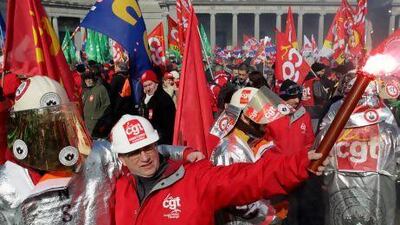BRUSSELS // European Union leaders tried yesterday to find a balance between austerity measures and growth policies, amid rising fears of social unrest as unemployment soars and Europe's economy remains in the doldrums.
Germany, the bloc's strongest economy and paymaster, was holding to a hardline on austerity, insisting that only discipline would ensure real growth.
France and several other struggling nations want some leeway to ease the immediate pain.
The debate is more than merely academic. A brash anti-austerity party won a stunning 25 per cent of the vote in last month's Italian elections, a warning to the German chancellor, Angela Merkel, who faces the polls this year.
Thousands of workers protested in Brussels yesterday, demanding an end to austerity measures and, instead, a focus on boosting growth and reducing unemployment.
Trade unions set up camp across from the summit venue, aiming to make their point, amid a heavy police presence, with huge banners proclaiming "Austerity Pact, No! Solidarity Pact, Yes!"
"We do not need another summit where EU [leaders] try to sugar-coat and deny the harsh reality," said Hannes Swoboda, the head of the Social Democrat group in the European Parliament. "We need action and new tools to get Europeans back into jobs and our economies back on track."
Herman Van Rompuy, the EU president, said that even if the worst of the debt crisis appeared to be over, leaders were still meeting against a backdrop of "social distress".
It is not a choice between austerity and growth, he said - the EU had to make the grade on all fronts.
"In the short-term, we cannot turn a blind eye to the social emergency in some of our countries," he added, highlighting the danger of soaring youth unemployment, which is running at more than 50 per cent in Greece and Spain.
One EU official said the result of the Italian election "has made a lot of people think".
The problem, he added, was that governments still needed to balance public finances after years of overspending, but austerity and belt-tightening could not be the only response.
"You need to implement these plans carefully and with flexibility, otherwise there is no growth," the official said. "If there is no growth for 10 years then you can't pay back your debt ... there is not much room for manoeuvre."
A draft of the summit conclusions said that given the currently "unacceptably high levels of unemployment" - expected to hit an unprecedented high of around 12 per cent this year - it was critical to support growth "as a matter of priority".
The key to stabilising public finances must be "growth-friendly fiscal consolidation", it added.
Another EU official said this language offered the possibility that targets could be eased or adjusted, with leaders trying to nail down "what growth-friendly fiscal consolidation really means" in practice.
The issue is crucial for France after the president, Francois Hollande, recognised he could not cut its public deficit to the EU limit of 3 per cent of gross domestic product this year, Instead it is 3.7 per cent as a weak economy exacts its toll.
Failing to meet the target leaves France asking for another year of grace from Brussels, an extension it is likely to get. But the German finance minister, Wolfgang Schaeuble, made the case again on Wednesday for sticking to austerity.
"Growth and [budgetary] consolidation are not mutually exclusive but rather they reinforce each other," he said. "The confidence that solid-state finances brings is the precondition for sustainable growth."
Highlighting the point - and the sharp difference from France - the German government approved a 2014 budget based on the lowest headline deficit for about 40 years.
During their two-day talks, the 27 EU leaders will also discuss financially beleaguered Cyprus, taking the opportunity to meet its newly elected president, but they are not expected to make any decisions on a planned debt bailout. That issue will be covered by a separate eurozone finance ministers meeting late today after the summit closes.

